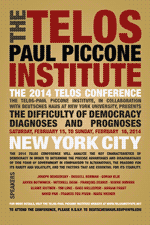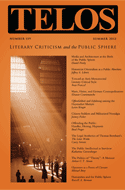By Mark S. Weiner · Thursday, April 10, 2014 The following paper was presented at the Eighth Annual Telos Conference, held on February 15–16, 2014, in New York City.
 As the final speaker after a fascinating day of talks, I’ll keep my comments brief. I’ll be addressing two questions about democracy raised by our conference description: first, “the reasons for its rarity and volatility”; and, second, “the factors that are essential for its stability.” For each question, I’ll try to provide a concise, mildly provocative answer from my perspective as a writer and scholar about constitutional law and comparative legal history. As the final speaker after a fascinating day of talks, I’ll keep my comments brief. I’ll be addressing two questions about democracy raised by our conference description: first, “the reasons for its rarity and volatility”; and, second, “the factors that are essential for its stability.” For each question, I’ll try to provide a concise, mildly provocative answer from my perspective as a writer and scholar about constitutional law and comparative legal history.
So why is democracy so rare and volatile? I think one answer we could give to this question is that democracy is volatile because the modern self is a legal achievement. There is nothing outside of law, including individual subjectivity. Instead, the modern self that lies at the center of liberal democratic practice developed only after a long historical process of dialectical negation and synthesis. In that process, a handful of societies, beginning in western Europe, transcended what in my most recent book I call the “rule of the clan.”
Continue reading →
By Casey Servais · Thursday, July 12, 2012 Casey Servais’s “‘A Certain Light, But Only a Juridical Light’: The Legal Aesthetics of Thomas Bernhard’s The Lime Works” appears in Telos 159 (Summer 2012). Read the full version online at the Telos Online website, or purchase a print copy of the issue here.
 Taking Thomas Bernhard’s 1970 novel The Lime Works as an exemplar of a group of post-World War II German and Austrian literary works that mimic identifiable genres of legal writing, this article offers two alternative theoretical models for making sense of the prevalence of legal-literary genre-mixing in postwar German-language literature. Viewed through the lens of Theodor W. Adorno’s Aesthetic Theory, the literary imitation of legal styles appears as an instance of “mimesis of the lethal,” the process by which artworks both adapt to and resist what Adorno calls “reification.” Viewed through the alternative lens of Jürgen Habermas’s Theory of Communicative Action, the literary use of legal styles can be seen as a way of partially reconciling modernity’s specialized discourses (such as science, art, and law) by uncovering the “tortuous routes” along which these discourses communicate with one another. Through a mixture of theory and formal analysis, the article offers both a new reading of Bernhard’s work and a new set of theoretical approaches that may prove fruitful to the study of Taking Thomas Bernhard’s 1970 novel The Lime Works as an exemplar of a group of post-World War II German and Austrian literary works that mimic identifiable genres of legal writing, this article offers two alternative theoretical models for making sense of the prevalence of legal-literary genre-mixing in postwar German-language literature. Viewed through the lens of Theodor W. Adorno’s Aesthetic Theory, the literary imitation of legal styles appears as an instance of “mimesis of the lethal,” the process by which artworks both adapt to and resist what Adorno calls “reification.” Viewed through the alternative lens of Jürgen Habermas’s Theory of Communicative Action, the literary use of legal styles can be seen as a way of partially reconciling modernity’s specialized discourses (such as science, art, and law) by uncovering the “tortuous routes” along which these discourses communicate with one another. Through a mixture of theory and formal analysis, the article offers both a new reading of Bernhard’s work and a new set of theoretical approaches that may prove fruitful to the study of
Continue reading →
By Russell A. Berman · Monday, September 4, 2006 Arguments against the treatment of prisoners at Guantanamo have generally focused on the problem of establishing a zone that appeared to be outside commonly accepted rules of law. The captives were treated neither as prisoners of war, subject to treaties and international law, nor were they seen as vested with the constitutional rights applicable within the US. To some extent, this ambiguous outcome resulted from the anomalous nature of the war in Afghanistan but generally characterizes the wider war on terror: the enemy, not made up of regular soldiers, is also not a composed simply of criminals in the normal sense of the term. To date, the conflict between the liberal approach to view terrorists as criminals and respond with police action and the administration’s view of them as enemies, justifying a war footing, leaves an unresolved categorical problem, which—to say the least—has become an enormous political problem.
As a problem for political theory, Guantanamo points to concerns about a “state of exception,” as formulated by thinkers as diverse as Carl Schmitt and Giorgio Agamben. To what extent do political systems depend on exceptions? That sort of argument, evidently, could lead to an apologetic claim of the necessity of extralegality. Others may wish to comment on that line of thought. Of additional interest however is the duplication of processes of extralegality in the recent experience with special prosecution. In terms of the political spectrum, if Guantanamo was a problem for “the right,” special prosecution—especially Fitzgerald’s—is a problem for the “the left.”
Continue reading →
|
|
 As the final speaker after a fascinating day of talks, I’ll keep my comments brief. I’ll be addressing two questions about democracy raised by our conference description: first, “the reasons for its rarity and volatility”; and, second, “the factors that are essential for its stability.” For each question, I’ll try to provide a concise, mildly provocative answer from my perspective as a writer and scholar about constitutional law and comparative legal history.
As the final speaker after a fascinating day of talks, I’ll keep my comments brief. I’ll be addressing two questions about democracy raised by our conference description: first, “the reasons for its rarity and volatility”; and, second, “the factors that are essential for its stability.” For each question, I’ll try to provide a concise, mildly provocative answer from my perspective as a writer and scholar about constitutional law and comparative legal history.  Taking Thomas Bernhard’s 1970 novel The Lime Works as an exemplar of a group of post-World War II German and Austrian literary works that mimic identifiable genres of legal writing, this article offers two alternative theoretical models for making sense of the prevalence of legal-literary genre-mixing in postwar German-language literature. Viewed through the lens of Theodor W. Adorno’s Aesthetic Theory, the literary imitation of legal styles appears as an instance of “mimesis of the lethal,” the process by which artworks both adapt to and resist what Adorno calls “reification.” Viewed through the alternative lens of Jürgen Habermas’s Theory of Communicative Action, the literary use of legal styles can be seen as a way of partially reconciling modernity’s specialized discourses (such as science, art, and law) by uncovering the “tortuous routes” along which these discourses communicate with one another. Through a mixture of theory and formal analysis, the article offers both a new reading of Bernhard’s work and a new set of theoretical approaches that may prove fruitful to the study of
Taking Thomas Bernhard’s 1970 novel The Lime Works as an exemplar of a group of post-World War II German and Austrian literary works that mimic identifiable genres of legal writing, this article offers two alternative theoretical models for making sense of the prevalence of legal-literary genre-mixing in postwar German-language literature. Viewed through the lens of Theodor W. Adorno’s Aesthetic Theory, the literary imitation of legal styles appears as an instance of “mimesis of the lethal,” the process by which artworks both adapt to and resist what Adorno calls “reification.” Viewed through the alternative lens of Jürgen Habermas’s Theory of Communicative Action, the literary use of legal styles can be seen as a way of partially reconciling modernity’s specialized discourses (such as science, art, and law) by uncovering the “tortuous routes” along which these discourses communicate with one another. Through a mixture of theory and formal analysis, the article offers both a new reading of Bernhard’s work and a new set of theoretical approaches that may prove fruitful to the study of 

